英语词汇正误辨析 (5)
- 格式:doc
- 大小:35.50 KB
- 文档页数:6
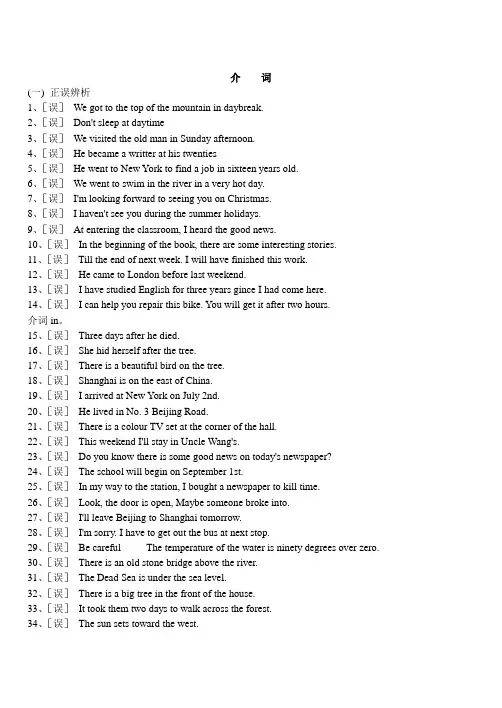
介词(一) 正误辨析1、[误]We got to the top of the mountain in daybreak.2、[误]Don't sleep at daytime3、[误]We visited the old man in Sunday afternoon.4、[误]He became a writter at his twenties5、[误]He went to New Y ork to find a job in sixteen years old.6、[误]We went to swim in the river in a very hot day.7、[误]I'm looking forward to seeing you on Christmas.8、[误]I haven't see you during the summer holidays.9、[误]At entering the classroom, I heard the good news.10、[误]In the beginning of the book, there are some interesting stories.11、[误]Till the end of next week. I will have finished this work.12、[误]He came to London before last weekend.13、[误]I have studied English for three years gince I had come here.14、[误]I can help you repair this bike. Y ou will get it after two hours.介词in。
15、[误]Three days after he died.16、[误]She hid herself after the tree.17、[误]There is a beautiful bird on the tree.18、[误]Shanghai is on the east of China.19、[误]I arrived at New Y ork on July 2nd.20、[误]He lived in No. 3 Beijing Road.21、[误]There is a colour TV set at the corner of the hall.22、[误]This weekend I'll stay in Uncle Wang's.23、[误]Do you know there is some good news on today's newspaper?24、[误]The school will begin on September 1st.25、[误]In my way to the station, I bought a newspaper to kill time.26、[误]Look, the door is open, Maybe someone broke into.27、[误]I'll leave Beijing to Shanghai tomorrow.28、[误]I'm sorry. I have to get out the bus at next stop.29、[误]Be careful The temperature of the water is ninety degrees over zero.30、[误]There is an old stone bridge above the river.31、[误]The Dead Sea is under the sea level.32、[误]There is a big tree in the front of the house.33、[误]It took them two days to walk across the forest.34、[误]The sun sets toward the west.35、[误]Do you have no other clothes except those?36、[误]Can I write the exam paper with ink?37、[误]I'm earlier today. I came here by his car.38、[误]A lot of French wines are made of grape.39、[误]This is a good dictionary in English grammar.40、[误]Do you have the key of the door.41、[误]Today a lot of Chinese people have interest of collecting stamps.42、[误]I didn't do my homework, so the teacher was angry to me.43、[误]He was good for skating.44、[误]It was good to you to help my little boy.45、[误]My parents were very pleased at me.46、[误]He is agree with me.47、[误]He againsts me.48、[误]I haven't heard letters from him.49、[误]Teacher. May I call at you this weekend?50、[误]Do you know the girl on white?51、[误]He looked at me at surprise.52、[误]She didn't come to school because of she was ill.[(三) 例题解析1 - Thank you ___the beautiful flowers!- Not at all.A inB onC atD for2 Can you answer this question ___English?A byB inC withD from3 Look ___the map ___China ___the wall, please.A after, of, inB at, of, inC after, in, onD at, of, on4 - When did Mr Green arrive in London?- He arrived there ___the evening of December 6th.A atB inC onD to5 We won the relay race. And there was a big smile ___our teacher's face.A offB nearC onD between6 The twins got on well ___their classmates.A toB inC withD about7 - Please remember to come to my birthday party.- I see. I'll come ___Saturday evening.A inB atC onD for9 They will have a maths test ___two daysA forB atC inD after10 My brother joined the army ___A1989,March B in March,1989C March,1989D 1989,in March11 He couldn't work out the maths problem ___your helpA withoutB underC forD with12 Granny took one look at us ___her glassesA byB throughC onD in13 We had our breakfast ___a quarter ___sevenA/,to B in,to C at,to D on,to14 I learn French ___the radio every dayA onB inC fromD at15 It's good manners to wait ___lineA inB onC atD with16 How many English words had you learnt ___last term?A by the end ofB at the end ofC to the end ofD till the end of17 The manager was very satisfied ___his workA inB onC aboutD with18 John hit Jack ___faceA on theB in theC on hisD in his19 I was born ___the night ___September 15,1978A in,onB at,onC at,inD on,of20 It's a bad manner to laugh ___people when they are ___troubleA over,inB at,inC in,atD at,for21 I can't do this work well ___Tom's helpA underB forC withoutD from22 Don't shout ___the old woman。
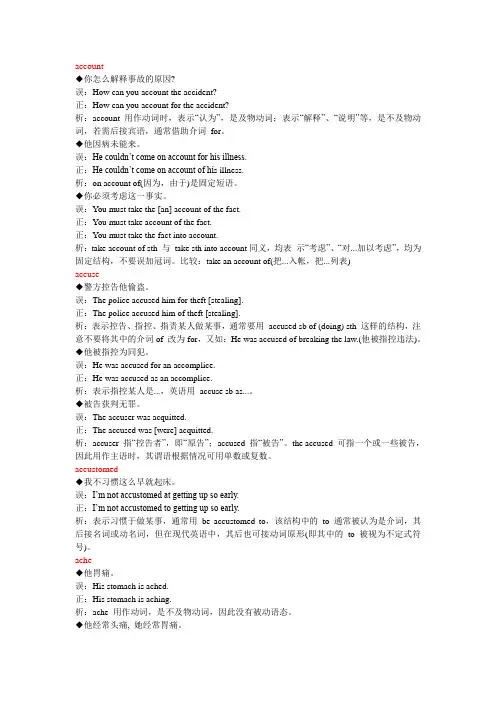
account◆你怎么解释事故的原因?误:How can you account the accident?正:How can you account for the accident?析:account 用作动词时,表示“认为”,是及物动词;表示“解释”、“说明”等,是不及物动词,若需后接宾语,通常借助介词for。
◆他因病未能来。
误:He couldn’t come on account for his illness.正:He couldn’t come on account of hi s illness.析:on account of(因为,由于)是固定短语。
◆你必须考虑这一事实。
误:You must take the [an] account of the fact.正:You must take account of the fact.正:You must take the fact into account.析:take account of sth 与take sth into account同义,均表示“考虑”、“对...加以考虑”,均为固定结构,不要误加冠词。
比较:take an account of(把...入帐,把...列表)accuse◆警方控告他偷盗。
误:The police accused him for theft [stealing].正:The police accused him of theft [stealing].析:表示控告、指控、指责某人做某事,通常要用accused sb of (doing) sth 这样的结构,注意不要将其中的介词of 改为for,又如:He was accused of breaking the law.(他被指控违法)。
◆他被指控为同犯。
误:He was accused for an accomplice.正:He was accused as an accomplice.析:表示指控某人是...,英语用accuse sb as...。
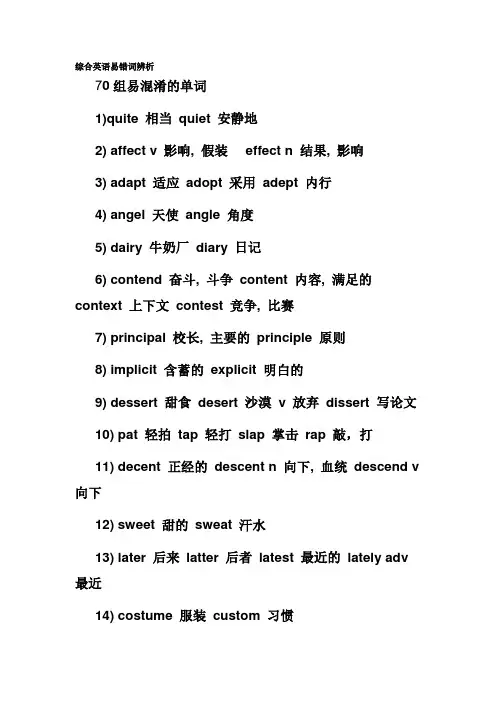
综合英语易错词辨析70组易混淆的单词1)quite 相当quiet 安静地2) affect v 影响, 假装 effect n 结果, 影响3) adapt 适应adopt 采用adept 内行4) angel 天使angle 角度5) dairy 牛奶厂diary 日记6) contend 奋斗, 斗争content 内容, 满足的context 上下文contest 竞争, 比赛7) principal 校长, 主要的principle 原则8) implicit 含蓄的explicit 明白的9) dessert 甜食desert 沙漠v 放弃dissert 写论文10) pat 轻拍tap 轻打slap 掌击rap 敲,打11) decent 正经的descent n 向下, 血统descend v 向下12) sweet 甜的sweat 汗水13) later 后来latter 后者latest 最近的lately adv 最近14) costume 服装custom 习惯15) extensive 广泛的intensive 深刻的16) aural 耳的oral 口头的17) abroad 国外aboard 上(船,飞机)18) altar 祭坛alter 改变19) assent 同意ascent 上升accent 口音20) champion 冠军champagne 香槟酒campaign 战役21) baron 男爵barren 不毛之地的barn 古仓22) beam 梁,光束bean 豆been have 过去式23) precede 领先proceed 进行,继续24) pray 祈祷prey 猎物25) chicken 鸡kitchen 厨房26) monkey 猴子donkey 驴27) chore 家务活chord 和弦cord 细绳28) cite 引用site 场所sight 视觉29) clash (金属)撞击声crash 碰幢,坠落crush 压坏30) compliment 赞美complement 附加物31) confirm 确认conform 使顺从32) contact 接触contract 合同contrast 对照33) council 议会counsel 忠告consul 领事34) crow 乌鸦crown 王冠clown 小丑cow 牛35) dose 一剂药doze 打盹36) drawn draw 过去分词drown 溺水37) emigrant 移民到国外immigrant 从某国来的移民38) excess n 超过exceed v超过excel 擅长39) hotel 青年旅社hostel 旅店40) latitude 纬度altitude 高度gratitude 感激41) immoral 不道德的immortal 不朽的42) lone 孤独的alone 单独的lonely 寂寞的43) mortal 死的metal 金属mental 神经的medal 勋章model 模特meddle 玩弄44) scare 惊吓scarce 缺乏的45) drought 天旱draught 通风, 拖拉draughts (英)国际跳棋47) assure 保证ensure 使确定insure 保险48) except 除外expect 期望accept 接受excerpt 选录exempt 免除49) floor 地板flour 面粉50) incident 事件accident 意外51) inspiration 灵感aspiration 渴望52) march 三月, 前进match 比赛53) patent 专利potent 有力的potential 潜在的54) police 警察policy 政策politics 政治55) protest 抗议protect 保护56) require 需要inquire 询问enquire 询问acquire 获得57) revenge 报仇avenge 为...报仇58) story 故事storey 楼层store 商店59) strike 打stick 坚持strict 严格的60) expand 扩张expend 花费extend 延长61) commerce 商业commence 开始62) through 通过thorough 彻底的(al)though 尽管thought think 过去分词63) purpose 目的suppose 假设propose 建议64) expect 期望respect 尊敬aspect 方面inspect 视察suspect 怀疑65) glide 滑翔slide 使滑行slip 跌落66) steal 偷steel 钢67) strive 努力stride 大步走68) allusion 暗示illusion 幻觉delusion 错觉elusion 逃避69) prospect 前景perspective 透视法70) stationery 文具stationary 固定的71) loose 松的lose 丢失loss n 损失lost lose过去式常用连接代词辅导连词是一种不在句子中担任句子成分而只起连接词与词,短语与短语以及句与句的作用。
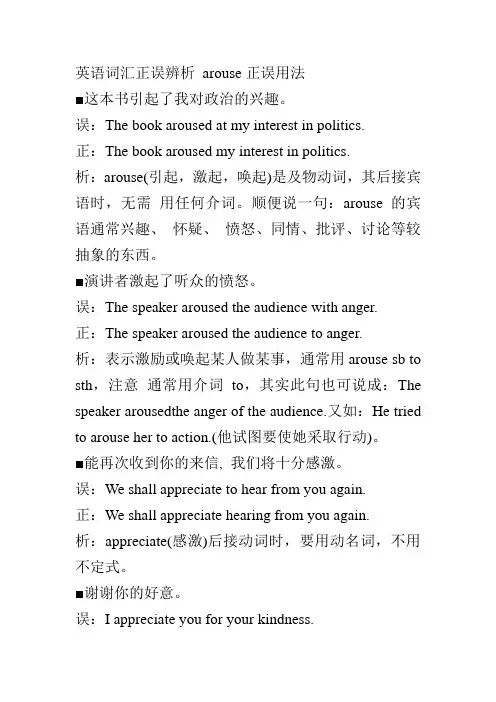
英语词汇正误辨析arouse正误用法■这本书引起了我对政治的兴趣。
误:The book aroused at my interest in politics.正:The book aroused my interest in politics.析:arouse(引起,激起,唤起)是及物动词,其后接宾语时,无需用任何介词。
顺便说一句:arouse 的宾语通常兴趣、怀疑、愤怒、同情、批评、讨论等较抽象的东西。
■演讲者激起了听众的愤怒。
误:The speaker aroused the audience with anger.正:The speaker aroused the audience to anger.析:表示激励或唤起某人做某事,通常用arouse sb to sth,注意通常用介词to,其实此句也可说成:The speaker arousedthe anger of the audience.又如:He tried to arouse her to action.(他试图要使她采取行动)。
■能再次收到你的来信, 我们将十分感激。
误:We shall appreciate to hear from you again.正:We shall appreciate hearing from you again.析:appreciate(感激)后接动词时,要用动名词,不用不定式。
■谢谢你的好意。
误:I appreciate you for your kindness.正:I appreciate your kindness.正:Thank you for your kindness.析:其后只能接“事”作宾语,而不能接“人”作宾语,此用法与thank 的用法恰恰相反。
■如果你能帮助我做这事,我将十分感激。
误:I would appreciate very much if you would help me with it.正:I would appreciate it very much if you would help me with it.析:appreciate(感激)是及物动词,其后不能没有宾语。
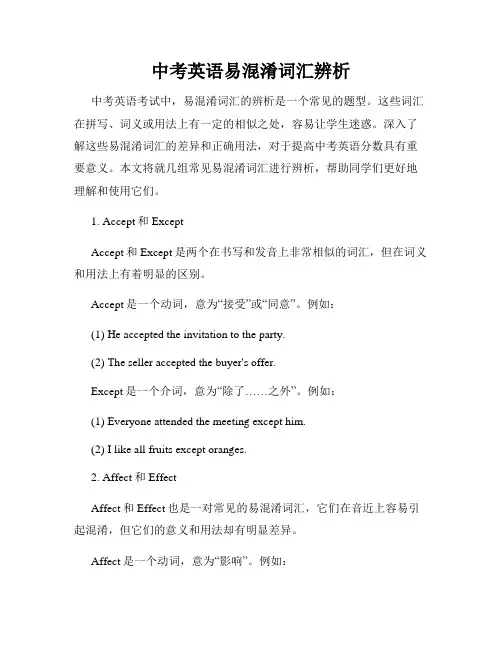
中考英语易混淆词汇辨析中考英语考试中,易混淆词汇的辨析是一个常见的题型。
这些词汇在拼写、词义或用法上有一定的相似之处,容易让学生迷惑。
深入了解这些易混淆词汇的差异和正确用法,对于提高中考英语分数具有重要意义。
本文将就几组常见易混淆词汇进行辨析,帮助同学们更好地理解和使用它们。
1. Accept和ExceptAccept和Except是两个在书写和发音上非常相似的词汇,但在词义和用法上有着明显的区别。
Accept是一个动词,意为“接受”或“同意”。
例如:(1) He accepted the invitation to the party.(2) The seller accepted the buyer's offer.Except是一个介词,意为“除了……之外”。
例如:(1) Everyone attended the meeting except him.(2) I like all fruits except oranges.2. Affect和EffectAffect和Effect也是一对常见的易混淆词汇,它们在音近上容易引起混淆,但它们的意义和用法却有明显差异。
Affect是一个动词,意为“影响”。
例如:(1) The heavy rain affected the traffic.(2) Lack of exercise can affect your health.Effect既可以是名词,意为“效果”或“影响”,也可以是动词,意为“产生影响”。
例如:(1) The medicine has a good effect on curing the disease.(2) His speech effectively influenced the audience.3. Advice和AdviseAdvice是一个名词,意为“建议”或“忠告”。
例如:(1) I need some advice on how to solve this problem.(2) His advice helped me make a decision.Advise是一个动词,意为“建议”。
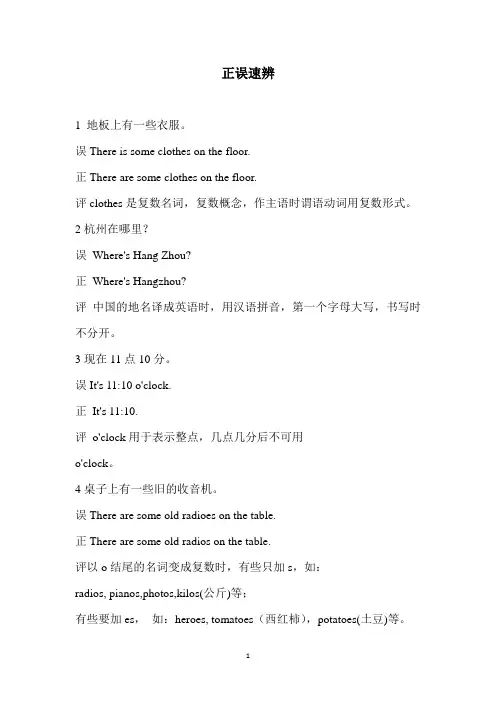
正误速辨1 地板上有一些衣服。
误There is some clothes on the floor.正There are some clothes on the floor.评clothes是复数名词,复数概念,作主语时谓语动词用复数形式。
2杭州在哪里?误Where's Hang Zhou?正Where's Hangzhou?评中国的地名译成英语时,用汉语拼音,第一个字母大写,书写时不分开。
3现在11点10分。
误It's 11:10 o'clock.正It's 11:10.评o'clock用于表示整点,几点几分后不可用o'clock。
4桌子上有一些旧的收音机。
误There are some old radioes on the table.正There are some old radios on the table.评以o结尾的名词变成复数时,有些只加s,如:radios, pianos,photos,kilos(公斤)等;有些要加es,如:heroes, tomatoes(西红柿),potatoes(土豆)等。
5她的家离这里不远。
误Her family is not far from here.正Her home is not far from here.评family指由父母和子女组成的家庭。
home指人出生和居住的地方。
6他喝了两杯咖啡。
误He drank two cup of coffee.误He drank two cups coffee.正He drank two cups of coffee.评不可数名词如tea,coffee,wine,ink,water等表示量时,可用a cup of(一杯),a glass of(一杯) 等,表示复数时则说two cups of, three glasses of等。
7他们是日本人。
误They are Japaneses.正They are Japanese.评Japanese,Chinese等表示国人的词,单复数形式相同。
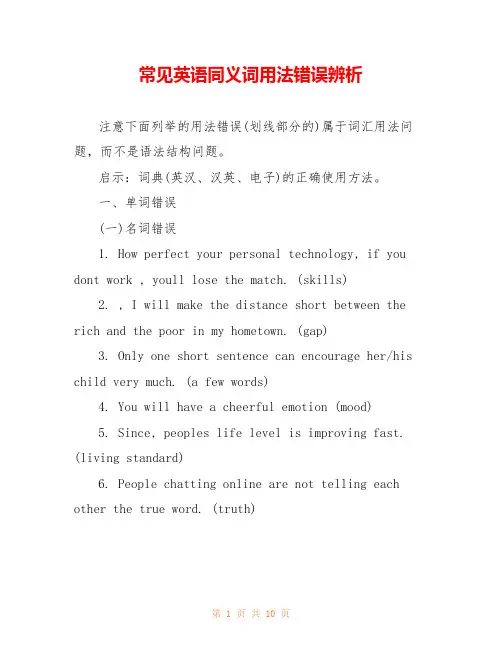
常见英语同义词用法错误辨析注意下面列举的用法错误(划线部分的)属于词汇用法问题,而不是语法结构问题。
启示:词典(英汉、汉英、电子)的正确使用方法。
一、单词错误(一)名词错误1. How perfect your personal technology, if you dont work , youll lose the match. (skills)2. , I will make the distance short between the rich and the poor in my hometown. (gap)3. Only one short sentence can encourage her/his child very much. (a few words)4. You will have a cheerful emotion (mood)5. Since, peoples life level is improving fast. (living standard)6. People chatting online are not telling each other the true word. (truth)7. If a person doesnt want to talk about or tell their heart-thing to his friends,(worries/concers/cares)8. he would have some spiritual barricade1.(mental breakdown2)9. In the rainy weather, the cases (roadconditions) are especially terrible. (things)表示情况的词汇辨析:case, circumstance, situation,10. Just like playing games, one mark will let you lose. (point)比较score, result,mark,point.(二)形容词错误1. In my opinion, to be a good parent isforher/his child. This thought is so easy. (simplistic)2. If you dont want to lead an easy life, workhard! (simple/ordinary)3. He told me he wanted to call me when I was convenient, but I was cheated. (available/free)4. The fire was coming to them, so all of themwere very dangerous. (in danger)5. After this incident, I was very painful and did not want to go to school. (upset)6. Prices are much cheaper in street markets. (lower)7. If you are high level, you will be noticed by others quickly. (outstanding)8. they know they must learn about the past, they should be hard. (hard-working)9. As far as my English is concerned, myvocabulary is too little. (limited)10. Eating outside is not as economic as cooking and eating at home. (economical)11. Receiving the results, my mind was completely empty. (blank)12. Hearing his words, my heart became very comple. (heavy)(三)动词和动词短语1. They think: I must cant pass the eam whateverit is, so I give up. (delete)2. TV watchers, like me, dont like the programs to be broken by the ads. (interrputed)3. A man who is too proud must not take other peoples advice. (will definitely )4. Because, he must meet all sorts of difficulties and obstacles. (will surely/definitely)5. Only when you insist working hard, can you realize your ideal. (keep)6. I was very angry that she doubted that I cheated in her eam. (suspected)7. If thats the case, our hometown must become more beautiful in the future. (will definitely)(四)副词1. Especially, science and technology are highly important and emphasized. (Particularly)2. Only this, they can make the distant with children short. (thus/in this way)二、搭配错误(一)动词+名词搭配错误(动词与名词不搭配)1. Teamwork spirit is very important, especially when you attend the match such as football match. (participate in)2. Her father received the telephone and told me that sheand I felt very (answered)3. This certainly effects the peoples lives; theycan choose any kind if they want. (affect)4. All these could effect the marks of the eam and might make them unable to study in a school a wholeyear. (affect)5. It seemed that no one who can cause myattention. (attract)6. It (maths problem) was that hard that (it)spent him a whole night. (took)7. It is students duty to study knowledge at university.(acquire)8. Love is not all about roses, every one has towork to maintain his/her life. (sustain3)9. All parents want their kids to accept good education. (receive)10. The old man appreciated him very much. (liked)11. Because it is still eist and effect you.(affect)12. Some freshmen4 are trying to suit the newschool. (adapt to)13. Internet also effects ones health. (affects)14. When we touch the other people in the society, (are in contact with)15. At the same time you omit the friends around you. (ignore)16. , but we cant speak our unhappiness to other people (tell)17. I dream one day, the farmers go abroad tostudy new knowledge. (acquire)18. So it is important to raise the friendship between people. (promote)19. Now we are learning knowledge in the university, self-confidence can help us (acquiring)20. Why did he (Bill Gates) receive so great success (achieve)21. and you also must know how it (TV) effects our living. (affects)22. On my first day at college, I met many new faces. (saw)23. I think the educational department shouldlight the students burden. (reduce/lighten)24. It not only epands our eyes, (widens)25. My mother is very patient and not afraid me add trouble. (make trouble)26. Young people worship stars blindly so theywill miss themselves. (lose)27. If we dont delete the eaminations, quality education is an empty word. (abolish5)(二)及物、不及物动词混用1. I pity very much when I heard that father divorced with her mother ... (divorced)2. Some students are very lazy and only prepare the eams ... (prepare for)3. I usually rela myself by listening to light music. (delete)4. In classroom, we often argue questions to enlarge our minds. (argue over)5. I disagree the opinion leaning about the past has no in the present. (disagree with)6. To me, I prefer to agree the latter one. (agree to)7. A good parent shouldnt interfere6 his childs life too much. (interfere in)8. If the consumers complain the quality of the products, (complain about)9. I dont believe fate because the road is under your foot. (believe in)10. I felt very angry that he said I did not care him. (care about)(三)形容词+名词搭配1. In modern society, peoples nervous work often makes them too tired. (intense)2. If you are not confident, youll never face the cruel competition in the society. (fierce)3. My hometown, a small village with hard-working and simple-minded people. (pure and honest)4. First, the advanced school and high level teachers are needed. (well-qualified)5. It is better not to be romantic in ourrealistic life. (real)6. We all epected him to be a black horse in the football match against class2. (dark)7. Now the summer holiday is over, and nervous study life has begun. (intense)8. In big cities, there is always crowded traffic, while in the countryside (heavy/congested)(四) 汉语成语的影响1. I am eighteen years old and I am the pearl7 on my parents palm. (apple of my parents eye)2. Plain face towards sky is my habit. (Wearing no make up/ Chinese phrase sumianchaotian)3. A parent mustnt pick shoots to help growth. (spoil children by ecessive enthusiasm)4. It is no better than fifty paces laughing at 100 paces. (the pot calls the kettle black)5. All parents look their sons to be dragons and (epect their sons to be talents)6. (All parents look) their daughters to bephoeni8. (epect their daughters to be talents)7. If you dont admit this point, you are stealing bell covering ears. (deceiving yourself)(五) 未归类错误1. and we are always having touch with each other. (keeping)2. I think it is very right to say pride leads to failure. (quite)3. If I can change, I will etend the small factories in my hometown and ... (epand)4. He committed suicide9 three times and at last he decided10 to live on to struggle. (attempted) 自我总结:1、平日记忆单词的习惯;2、平日使用词典的习惯;3、改进的方案;。
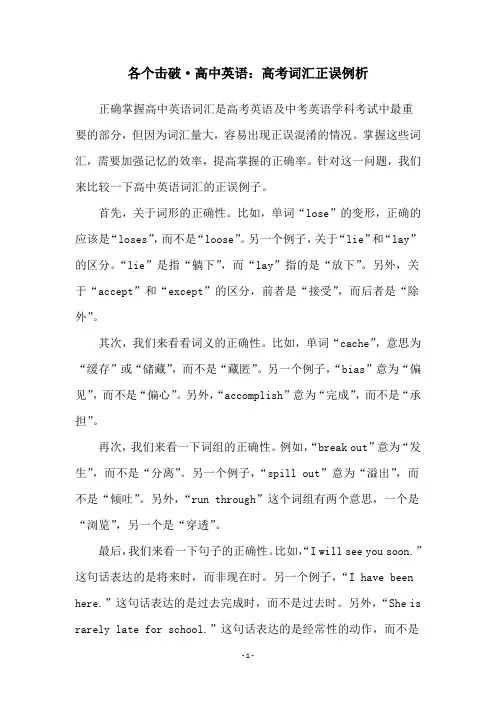
各个击破·高中英语:高考词汇正误例析正确掌握高中英语词汇是高考英语及中考英语学科考试中最重要的部分,但因为词汇量大,容易出现正误混淆的情况。
掌握这些词汇,需要加强记忆的效率,提高掌握的正确率。
针对这一问题,我们来比较一下高中英语词汇的正误例子。
首先,关于词形的正确性。
比如,单词“lose”的变形,正确的应该是“loses”,而不是“loose”。
另一个例子,关于“lie”和“lay”的区分。
“lie”是指“躺下”,而“lay”指的是“放下”。
另外,关于“accept”和“except”的区分,前者是“接受”,而后者是“除外”。
其次,我们来看看词义的正确性。
比如,单词“cache”,意思为“缓存”或“储藏”,而不是“藏匿”。
另一个例子,“bias”意为“偏见”,而不是“偏心”。
另外,“accomplish”意为“完成”,而不是“承担”。
再次,我们来看一下词组的正确性。
例如,“break out”意为“发生”,而不是“分离”。
另一个例子,“spill out”意为“溢出”,而不是“倾吐”。
另外,“run through”这个词组有两个意思,一个是“浏览”,另一个是“穿透”。
最后,我们来看一下句子的正确性。
比如,“I will see you soon.”这句话表达的是将来时,而非现在时。
另一个例子,“I have been here.”这句话表达的是过去完成时,而不是过去时。
另外,“She is rarely late for school.”这句话表达的是经常性的动作,而不是仅一次的动作。
通过以上的正误例子,我们可以发现,要掌握高中英语词汇是非常重要的,尤其是记住正确的用法、词义和句子的用法,这样才能保证学习的效果。
为此,我们需要大量积累,通过不断记忆、理解和掌握这些词汇,最终达到正确使用的目的。
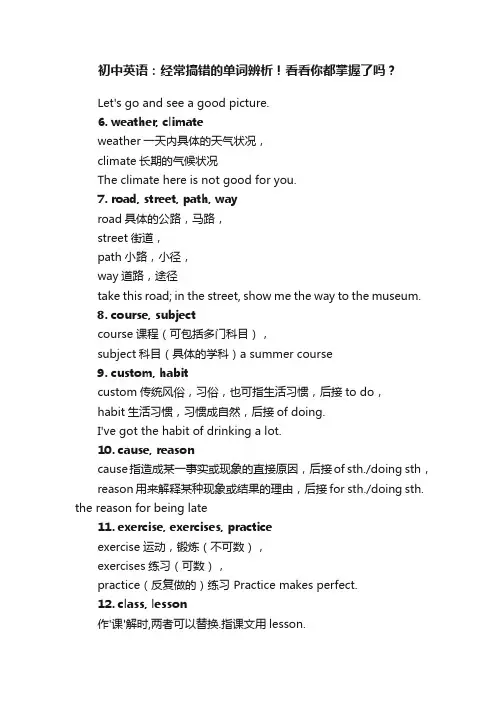
初中英语:经常搞错的单词辨析!看看你都掌握了吗?Let's go and see a good picture.6. weather, climateweather一天内具体的天气状况,climate长期的气候状况The climate here is not good for you.7. road, street, path, wayroad具体的公路,马路,street街道,path小路,小径,way道路,途径take this road; in the street, show me the way to the museum.8. course, subjectcourse课程(可包括多门科目),subject科目(具体的学科)a summer course9. custom, habitcustom传统风俗,习俗,也可指生活习惯,后接to do,habit生活习惯,习惯成自然,后接of doing.I've got the habit of drinking a lot.10. cause, reasoncause指造成某一事实或现象的直接原因,后接of sth./doing sth,reason用来解释某种现象或结果的理由,后接for sth./doing sth. the reason for being late11. exercise, exercises, practiceexercise运动,锻炼(不可数),exercises练习(可数),practice(反复做的)练习 Practice makes perfect.12. class, lesson作'课'解时,两者可以替换.指课文用lesson.指班级或全体学生用class. lesson 6; class 513. speech, talk, lecturespeech指在公共场所所做的经过准备的较正式的演说,talk日常生活中的一般的谈话,讲话,lecture学术性的演讲,讲课a series of lecture on…14. work, job二者均指工作。
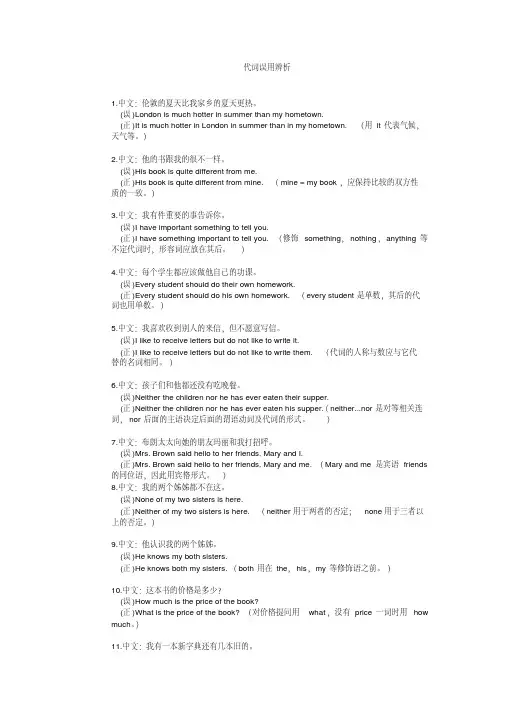
代词误用辨析1.中文:伦敦的夏天比我家乡的夏天更热。
(误)London is much hotter in summer than my hometown.(正)It is much hotter in London in summer than in my hometown.(用it代表气候,天气等。
)2.中文:他的书跟我的很不一样。
(误)His book is quite different from me.(正)His book is quite different from mine.(mine = my book,应保持比较的双方性质的一致。
)3.中文:我有件重要的事告诉你。
(误)I have important something to tell you.(正)I have something important to tell you.(修饰something,nothing,anything等不定代词时,形容词应放在其后。
)4.中文:每个学生都应该做他自己的功课。
(误)Every student should do their own homework.(正)Every student should do his own homework.(every student是单数,其后的代词也用单数。
)5.中文:我喜欢收到别人的来信,但不愿意写信。
(误)I like to receive letters but do not like to write it.(正)I like to receive letters but do not like to write them.(代词的人称与数应与它代替的名词相同。
)6.中文:孩子们和他都还没有吃晚餐。
(误)Neither the children nor he has ever eaten their supper.(正)Neither the children nor he has ever eaten his supper.(neither...nor是对等相关连词,nor后面的主语决定后面的谓语动词及代词的形式。
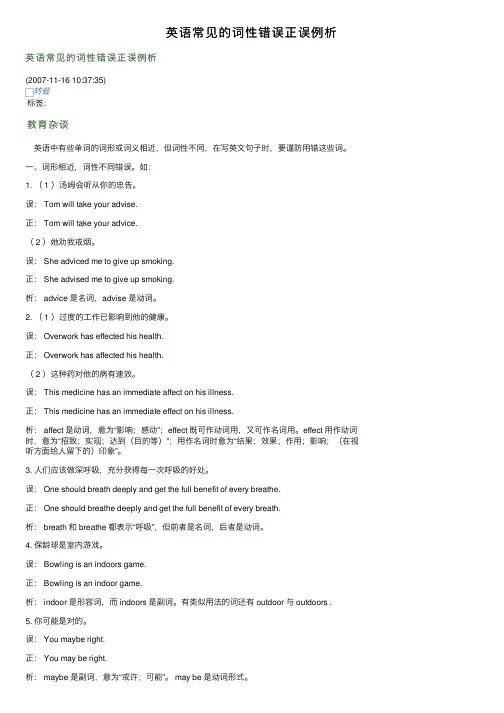
英语常见的词性错误正误例析英语常见的词性错误正误例析(2007-11-16 10:37:35)转载标签:教育杂谈英语中有些单词的词形或词义相近,但词性不同,在写英⽂句⼦时,要谨防⽤错这些词。
⼀、词形相近,词性不同错误。
如:1. ( 1 )汤姆会听从你的忠告。
误: Tom will take your advise.正: Tom will take your advice.( 2 )她劝我戒烟。
误: She adviced me to give up smoking.正: She advised me to give up smoking.析: advice 是名词,advise 是动词。
2. ( 1 )过度的⼯作已影响到他的健康。
误: Overwork has effected his health.正: Overwork has affected his health.( 2 )这种药对他的病有速效。
误: This medicine has an immediate affect on his illness.正: This medicine has an immediate effect on his illness.析: affect 是动词,意为“影响;感动”;effect 既可作动词⽤,⼜可作名词⽤。
effect ⽤作动词时,意为“招致;实现;达到(⽬的等)”;⽤作名词时意为“结果;效果;作⽤;影响;(在视听⽅⾯给⼈留下的)印象”。
3. ⼈们应该做深呼吸,充分获得每⼀次呼吸的好处。
误: One should breath deeply and get the full benefit of every breathe.正: One should breathe deeply and get the full benefit of every breath.析: breath 和 breathe 都表⽰“呼吸”,但前者是名词,后者是动词。
Unit5 易混易错点辨析●examine; check【教材原句】The first scientists to examine a preserved platypus body judged it a fake in the late 18th century. (教材P49)【辨析】两者都有“检查”的意思,但各有侧重。
examine 意思是“检查,审查,检验;考试,测验;仔细观察”等,重在过程,常指检查身体,对知识或技能考试,测验,对协议,稿件和方案的审查,也可指仔细观察/查看。
check意思是“检查;核对”,强调对已知的事物或成品从数量、质量或完损情况上进行核对和检查,对结果的进一步核实和校验。
常指核对已有的数据,材料,单子,或者检查机械类的东西是否完好,是否有故障等。
check 即可作名词也可作动词,词义也较多,这里我们只讲做动词且表示“检查,核对”时的用法。
温馨提示:check with sb. + 从句向某人核实某事check in at + 地点在旅馆,机场等入住、登记等check out of + 地点结账离开某地【例句呈现】Check the container for cracks or leaks.检验容器是否有裂缝或者漏的地方。
Check the oil and water before setting off.出发前应查看一下油和水。
Check your work before handing it in.交作业以前先检查一遍。
Cars are checked as they come off the production line.汽车下了生产线立即进行校验。
It should have been a simple matter to check.检查核对本来应该是件简单的事情。
Check the terms of the policy before you sign.仔细阅读保险单的条款后再签字。
初三英语词汇辨析常见错误在初三英语的学习中,词汇辨析是一个重要的部分,但同学们在这方面常常会出现一些错误。
以下是一些常见的错误类型及分析。
一、混淆近义词很多同学容易将意思相近的单词用错,比如“alone”和“lonely”。
“alone”侧重于“独自一人”,表示客观上的状态;而“lonely”则侧重于“孤独的、寂寞的”,更多地表达一种主观感受。
例如:He was alone in the room(他独自一人在房间里。
)He feels lonely because he has no friends (他感到孤独,因为他没有朋友。
)再比如“take”“bring”和“fetch”。
“take”表示“带走、拿走”,是把某物从说话者所在的地方带到别的地方;“bring”表示“带来、拿来”,是把某物从别的地方带到说话者所在的地方;“fetch”则表示“去取来、去拿来”,强调一个往返的动作。
例如:Take this book to the library(把这本书带到图书馆去。
)Bring me a cup of coffee(给我拿一杯咖啡来。
)Please fetch my bag from the classroom(请从教室把我的包拿来。
)二、忽略词汇的词性有些单词虽然拼写相同,但词性不同,意思和用法也不同。
比如“interest”这个词,既可以作名词,表示“兴趣”,也可以作动词,表示“使感兴趣”。
例如:My interest is reading(名词,我的兴趣是阅读。
)This book interests me(动词,这本书使我感兴趣。
)再如“success”是名词,“succeed”是动词,“successful”是形容词。
我们要说“He succeeded in the exam”(他考试成功了。
)而不能说“He successed in the exam”三、误解短语动词的含义短语动词也是同学们容易出错的地方。
英语误用词的理解与翻译英语中存在一些误用词,它们可能具有不同的含义或用法,甚至可能引起混淆。
以下是一些常见的英语误用词及其理解与翻译:1. "bank" ≠ "银行""Bank" 这个词有两个不同的拼写,一个是 " Bank",另一个是 "巴金斯"。
" Bank" 通常指河岸或银行,而 "巴金斯" 是英国的一种金属制酒壶。
如果某人在错误地使用 "bank" 这个词,可能是在描述一个银行,但也可能是在描述一种酒壶。
2. "blow" ≠ "吹气""Blow" 这个词可以表示 "吹气" 或 "爆炸",但在某些情况下也可以表示 "爆炸声"。
在某些地方,人们可能会用 "blow" 这个词来指代 "吹气",但在其他地区,它可能指代 "爆炸"。
因此,如果某人在错误地使用 "blow",可能是在描述一种行为或事件,但也可能是在描述某种物品。
3. "job" ≠ "工作""Job" 这个词可以表示 "工作" 或 "任务",但在某些情况下也可以表示 "雇用"。
因此,如果某人在错误地使用 "job",可能是在描述一种工作或雇用关系,但也可能是在描述某个任务或项目。
4. "knight" ≠ "骑士""Knight" 这个词可以表示 "骑士" 或 "雇佣骑士",但也有一些特殊情况。
易混词汇正误辨析1. clothes, cloth, clothingclothes统指各种衣服,谓语动词永远是复数cloth指布,为不可数名词clothing 服装的总称,指一件衣服用a piece of, an article of误:My clothes is over there.正:My clothes are over there.2. incident, accidentincident指小事件,通常指大事件中较小的事件,小插曲或人生中所碰到的虽小但留下较深印象的平凡事件。
它还用来指政治上具有一定影响的事态,如战争、,叛乱等。
accident指不幸的事故He was killed in the accident.误:The September 11th accident shocked us.正:The September 11th incident shocked us.3. amount, numberamount后接不可数名词number后接可数名词a number of students误:A larger amount of students are taking the exams right now.正:A large number of students are taking the exams right now.4. family, house, homehome 家,包括住处和家人house房子,住宅family家庭成员.My family is a happy one.误:My home were watching TV at that time.正:My family are watching TV at that time.5. sound, voice, noisesound自然界各种各样的声音voice人的嗓音noise噪音I hate the loud noise outside.误:I love all the voices outside.正:I love all the sounds outside.6. photo, picture, drawingphoto用照相机拍摄的照片picture可指相片,图片,电影片Let’s go and see a good picture.drawing画的画误:He is good at photoing.正:he is good at drawing.7. vocabulary, wordvocabulary词汇,一个人拥有的单词量He has a large vocabulary.word具体的单词误:Do you know the meaning of this vocabulary? 正:Do you know the meaning of this word?8. population, peoplepopulation人口,人数China has a large population. people具体的人误:What’s the people in China?正:What’s the population in China?9. weather, climateweather一天内具体的天气状况climate长期的气候状况The climate here is not good for you.误:What nice climate it is today!正:What nice weather it is today!10. road, street, path, wayroad具体的公路,马路take this road street街道I met him in the street the other day.path小路,小径way道路,途径show me the way to the museum.误:Only in this street can you learn English well.正:Only in this way can you learn English well.11. course, subjectcourse课程(可包括多门科目)subject科目(具体的学科)误:In order to improve his study, he decided to take a winter subject. 正:In order to improve his study, he decided to take a winter course.12. custom, habitcustom传统风俗,习俗,也可指生活习惯,后接to do habit生活习惯,习惯成自然,后接of doing.误:I’ve got the custom of drinking a lot.正:I’ve got the habit of drinking a lot.13. cause, reasoncause 指造成某一事实或现象的直接原因,后接of sth./doing sth,reason用来解释某种现象或结果的理由,后接for sth./doing sth. 误:What’s the cause of your being late?正:What’s the reason for your being late?14. exercise, exercises, practiceexercise运动,锻炼(不可数)exercises练习(可数)practice(反复做的)练习Practice makes perfect.误:He exercises playing the piano every day.正:He practices playing the piano every day.15. class, lesson作”课”解时,两者可以替换.指课文用lesson. 指班级或全体学生用class. lesson 6; class 5 误:The lesson is doing exercises now.正:The class are doing exercises now.16. speech, talk, lecturespeech指在公共场所所做的经过准备的较正式的演说talk日常生活中的一般的谈话,讲话lecture学术性的演讲,讲课a series of lecture on…误:The teacher is going to have a speech with me.正:The teacher is going to have a talk with me.17. officer, officialofficer部队的军官,official政府官员误:He is an official. He works in the army.正:He is an officer. He works in the army.18. work, job二者均指工作。
词组例句across ◆不要杞人忧天。
误:Don’t across the bridge until you come to it.正:Don’t cross the bridge until you come to it.正:Don’t walk across the bridge until you come to it.析:across 是介词或副词(不是动词),cross 是动词。
◆湖面结冰了, 所以我们就从冰上走过。
误:The lake was frozen, so we walked through the ice.正:The lake was frozen, so we walked across the ice.析:across 和through 都可表示从一边到另一边的意思,但前者面(与on有关),而后者则主要涉及立体空间(与in有关)。
◆几天前我碰到了她, 就把这消息告诉她了。
误:I came over her the other day and told her the news.正:I came across her the other day and told her the news.析:come (run) across 是习语,意为“碰到(某人或某物)”。
act ◆受过训练的狗可以为盲人引路。
误:A trained dog can act for a guide to a blind man.正:A trained dog can act as a guide to a blind man.析:act for 指“代理”或“代表”;act as 指“担任”、“充当”、“起...的As the chairman is ill, I’m asking Mr Smith to act for him.(主席病了斯先生代理)。
◆他在偷东西时被逮个正着。
误:He was caught in the act to steal.正:He was caught in the act of stealing.析:catch sb in the act of doing 是固定句型, 意为“抓住某人做某事active ◆他积极参加体育活动(踢足球)吗?误:Is he active in sports (football)?正:Does he go in for sports (football)?析:be active in (积极参加)通常不用于体育活动方面。
英语词汇正误辨析:afford正误用法◆他卖不起小车。
误:He doesn’t afford (to have) a car.正:He can’t afford (to have) a car.析:afford(担负得起)通常要与can, be able to 连用。
◆那样的东西许多人可以买得起。
误:Such things can be afforded by many people.正:Many people can afford such things.析:在现代英语中afford(负担得起)不用于被动语态。
◆我想请人把车子修一下, 因为我买不起新的。
误:I want to get my car repaired because I can’t afford the money for a new one.正:I want to get my car repaired because I can’t afford (to buy) a new one.析:afford(负担得起)可用于金钱方面(用于afford to buy 之类的),但通常不直接以money 为宾语(from )。
◆电视给人以快乐。
误:Television affords pleasure for us.正:Television affords pleasure to us.析:afford(提供)可接双宾语(直接宾语通常为抽象概念),若双宾语易位,要用介词to。
注意:afford 表示“提供”时, 无需与can, be able to 连用。
英语词汇正误辨析:agree的正误用法◆他们同意我做这事。
误:They agreed me to do it.正:They agreed to let me do it.正:They agreed to my doing it.析:不要按汉语习惯用agree sb to do sth 来表示“同意某人做某事”, 要表示此意, 需改用其它结构。
词组例句ache ◆他胃痛。
误:His stomach is ached.正:His stomach is aching.析:ache 用作动词,是不及物动词,因此没有被动语态。
◆他经常头痛, 她经常胃痛。
误:He often gets headache and she often gets stomache.正:He often gets headaches and she often gets stomaches.析:ache 用作名词多用于复合词中:headache 头痛/toothache 牙痛/ stomachache 胃痛/ backache 背痛/earache 耳痛等,在这些带有-ache 的复合词中, headache是一个规则的可数名词(可连用a, 也可有复数), 而其它的词则用作可数或不可数名均可(在美国英语中多为可数名词):He is suffering from toothache(s).(他患牙痛)。
achieve ◆他实现了他的目标——写一本书。
误:He reached his aim—to write a book.正:He achieved his aim—to write a book.析:表示“实现目标”,通常用achieve an aim, 不用reach。
◆车速达到了每小时100英里。
误:The car achieved a speed of 100 mph.正:The car reached a speed of 100 mph.析:achieve 一般与令人愉快的事(如:成功、成就等)连用, 不要受汉语影响滥用此词表示一般意义的“达到”, 但是我们可以说: On the test drive he achieved the speed of 200mph.(在驾驶测试中他开车的速度达到了每小时200英里-----因为在驾驶测试中, 车速也是测试的项目之一)。
acknowledge ◆他们承认被打败了。
误:They acknowledged to be [to have been] defeated.正:They acknowledged having been defeated.正:They acknowledged that they were defeated.析:acknowledge(承认)后可接动名词或that从句,但一般不接不定式。
◆我承认你说的是真的。
误:I acknowledge your statement for true.正:I acknowledge your statement as true.正:I acknowledge your staetment to be true.正:I acknowledge that your statement is true.析:acknowledge sth 后通常可接as 或to be,但不能将其改为介词for。
accommodation ◆这个城市的住房很贵。
误:An accommodation is expensive in this city.正:Accommodation is expensive in this city.正:Accommodations are expensive in this city.析:accommodation 表示“住处”、“住宿”、“膳宿”等,在英国英语中是不可数名词,但在美国英语中通常用复数,一般不与不定冠词连用。
如:This hospital has accommodation(s) for 500 patients.(这家医院有五百个床位)。
They providegood accommodation(s).他们提供很好的膳宿服务。
accompany◆他坚持要陪她去车站。
误:He insisted on accompanying her to go to the station.正:He insisted on accompanying her to the station.析:表示陪某人去某地,只说accompany sb to a place即可,通常不说accompany sb to do sth。
◆我陪你去。
误:I will accompany with you.正:I will accompany you.析:accompany(陪伴, 伴随)是及物动词,其后无需用介词。
又如:Thunder accompanies lighting.(雷声伴着闪电)。
但是,用于被动语态的accompany 后面可接介词with 或by。
如:Thelightning is accompanied with thunder.(电闪雷鸣)。
He was accompanied by his secretary.(他有秘书随行)。
◆坐在这儿陪我一会儿。
误:Sit here and accompany me for a while.正:Sit here and keep me company me for a while.析:accompany 在一般英汉词典均注为“陪伴”、“陪同”,但它在英英词典里的在此义方面的释义是:to gosomewhere with someone, especially to look after them,所以不要一见到汉语的“陪伴”就用英语的accompany 去套译。
accomplish◆铁路何时竣工?误:When will the railway be accomplished?正:When will the railway be completed?析:accomplish 表示“完成”、“实现”等,其对象通常是task(任务),aim(目的),plan(计划),mission(使命),journey( 旅程)等含义较为抽象的东西。
它一般不用于建筑、书籍等具体的东西。
◆他是一位有造诣的学者。
误:He is an accomplishing scholar.正:He is an accomplished scholar.析:表示“有造诣的”、“有成就的”、“熟练的”、“有技巧的”等,accomplish 要用过去分词(实际上已转化为形容词)。
according ◆你将依照你工作的好坏而受到奖惩。
误:You will be praised or blamed according to your workisgood or bad.正:You will be praised or blamed according as your workisgood or bad.析:according to 和according as 均可表示“根据”、“按照”等,但前者相当于介词,后接相当于名词代词的成分;后者相当于连词,用以引导句子。
◆依我看, 这没有一点是真实的。
误:According to me, none of this is true.误:According to my opinion, none of this is true.正:In my opinion, none of this is true.析:according to 表示“根据”,通常是指根据别人或别处, 而不能根据自己,所以其后不能接表示第一人称的代词(如me, us), 同时也很少接表示第二人称的代词(you),但用于第三人称(如him, her, John, Mary, the doctor 等)则属正常用法;另外也不接view(看法)和opinion(意见)这类词表示看法的词。
◆这本书是根据一个真实故事写的。
误:The book is according to a true story.正:The book is based on a true story.析:表示“根据”、“按照”时, 主要用来引出状语, 一般不用来引出表语;但是当它表示“合乎”、“符合”时, 则主要用来引出表语:Isn’t it according to international law? (这难道不符合国际法吗?)Suspect ◆我猜想他就是那个扒手。
误:I suspect him the pickpocket.正:I suspect him to be the pickpocket.析:suspect(猜想, 认为)后不接“名词+名词”的结构,但是可接“名词+不定式(通常为to be)”,且该结构通常可以用从句来改写,如上面的误句也可说成:I suspect that he isthe pickpocket. 注:以上结构中的不定式通常是to be,若用其它动词,则通常是完成式或进行式,如:We suspect himto have said so.(我们猜他是那样说过),I suspect him to bedying.(我看他快要死了)。
◆她怀疑他拿了她的钱。
误:She suspected him for taking her money.正:She suspected him of taking her money.析:suspect sb of (doing) sth=猜测某人做某事(注意其中用介词of,不用for)。
如:We suspect him of telling lies.(我们怀疑他说谎)。
比较:I suspect him to be the thief. / I suspecthim of being the thief. / I suspect that he’s the thief.(我怀疑他就是那个贼)。
◆我对他的动机甚为怀疑。
误:I’m very suspect about his motives.正:I’m very suspicious about his motives.析:suspect 用作动词,其意=怀疑,猜测;用作名词,其意=嫌疑犯;用作形容词,其意=可疑的。
suspicious 是形容词,其意包括两个方面:①可疑的(常可与suspect 互换);②怀疑的,多疑的,疑心的(此时不可用suspect 代之)。
accordance ◆他的所作所为是完全合法的。
误:What he did is quite in the accordance with the law.正:What he did is quite in accordance with the law.析:in accordance with(与...一致,按照...)是固定短语,其中不用冠词。
如:He was buried in home town, in accordancewith his wishes.(按照他的意愿,他被葬在家乡)。